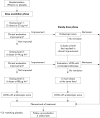Interferon beta-1a in ulcerative colitis: a placebo controlled, randomised, dose escalating study
- PMID: 12912859
- PMCID: PMC1773804
- DOI: 10.1136/gut.52.9.1286
Interferon beta-1a in ulcerative colitis: a placebo controlled, randomised, dose escalating study
Erratum in
- Gut. 2003 Nov;52(11):1657
Abstract
Background: and aims: Administration of interferon (IFN)-beta may represent a rational approach to the treatment of ulcerative colitis through its immunomodulatory and anti-inflammatory effects. The present study was performed to evaluate the efficacy and tolerability of IFN-beta-1a.
Methods: Patients (n=18) with moderately active ulcerative colitis were randomised to receive IFN-beta-1a or placebo. IFN-beta-1a was started at a dose of 22 micro g three times a week subcutaneously, and the dose was increased at two week intervals to 44 micro g and then to 88 micro g if no response was observed. The maximum duration of treatment was eight weeks. End points were clinical treatment response, defined as a decrease of at least 3 points from baseline in the ulcerative colitis scoring system (UCSS) symptoms score and induction of endoscopically confirmed remission.
Results: Baseline characteristics and disease severity were similar in both groups. Data from 17 patients are included in this report (10 patients in the IFN-beta-1a group and seven patients in the placebo group). Clinical response was achieved in five patients (50%) in the IFN-beta-1a group and in one (14%) in the placebo group (P=0.14). Remission was achieved in three patients in the IFN-beta-1a group and in none in the placebo group (p=0.02). Most adverse reactions associated with IFN-beta-1a were influenza-like symptoms or injection site reactions, and were mild or moderate in severity.
Conclusions: IFN-beta-1a may represent a promising novel treatment approach in ulcerative colitis.
Figures

References
-
- Brynskov J, Nielsen OH, Ahnfelt-Ronne I, et al. Cytokines (immunoinflammatory hormones) and their natural regulation in inflammatory bowel disease (Crohn’s disease and ulcerative colitis): a review. Dig Dis 1994;12:290–304. - PubMed
-
- Cassini-Raggi V, Kam L, Chong YJ, et al. Mucosal imbalance of IL-1 and IL-1 receptor antagonist in inflammatory bowel disease. A novel mechanism of chronic intestinal inflammation. J Immunol 1995;154:2434–40. - PubMed
-
- Sher ME, D’Angelo AJ, Stein TA, et al. Cytokines in Crohn’s colitis. Am J Surg 1995;169:133–6. - PubMed
-
- Hyams JS, Fitzgerald JE, Wyzga N, et al. Relationship of interleukin-1 receptor antagonist to mucosal inflammation in inflammatory bowel disease. J Pediatr Gastroenterol Nutr 1995;21:419–25. - PubMed
Publication types
MeSH terms
Substances
LinkOut - more resources
Full Text Sources
Other Literature Sources
Medical
